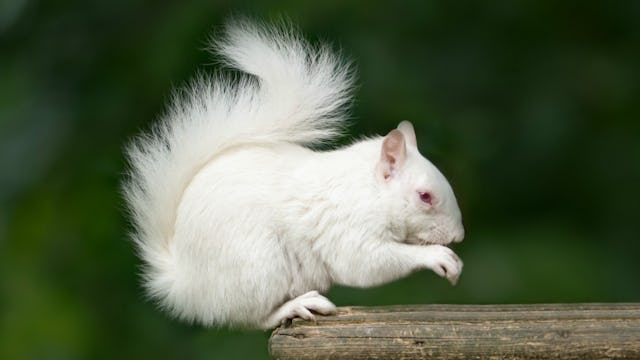My Hope For My Special Needs Son Who Is Headed To Kindergarten This Fall

There’s an albino squirrel at our favorite park. It’s a startling thing to see running up the length of a tree. Although it rarely runs. It swaggers next to you, keeping pace with the stroller and eye-balling you with one red eye. It’s so white you want to turn it over and check its label, like a handbag in a street sale. It’s the blonde you point to and whisper, “Straight from a bottle.”
The albino squirrel is infamous. The whole county knows and speaks of it. It’s our Sasquatch, our Nessie. I’m surprised it hasn’t been christened. Although what need would you have to name a thing that is already so notable? A name would be over-the-top, don’t you think? You can tell newcomers by their reaction to the squirrel. Any sign of surprise, and they’ve shown their hand. The regulars smile, nod in its direction, and then move on. We are a part of its life and it ours. It is our mascot, a Darwinian feat of evolution, thriving instead of surviving with its differences.
Which leads me, as it always does, back to my son — the boy with his own differences, cruising in the wheelchair by my side. A recent study published in Frontiers in Psychology looked at the reasons why kids reject other other kids. It turns out it doesn’t really have anything to do with the kid themselves. It’s what the differences in that kid imply for the rest of the group. Would the fallout be positive or negative?
After interviewing 853 kids in their early elementary years, the researchers noted that many of the reasons they chose to reject someone had to do with “preference and unfamiliarity.” The rejected kid looked or acted different and was therefore an unknown. If the aim is to survive and flourish in those early years, then of course you’re going to want to stick with other kids like you who already like the snacks you like and can play your playground games. To be different is to weaken the chain, and to be the one to accept the weak link is perhaps the worse fate. If as the researchers put it, “What you like is who you are, and the same goes for what you know,” then my son doesn’t stand a chance.
I have been spoiled. The special needs preschool that my son attends is year-round beginning at 6 weeks and extending up to kindergarten, like a gentle incline that stops abruptly before the cliff into public elementary school. Many of the kids in his class have known him since he was 2. His differences do not weaken the group because they are not different to them. They fight over who gets to push his wheelchair during recess. I also have several versions of the same video filmed over the years: peers leading rounds of applause when he tries a new food at lunch. His differences are their normal. So what happens when he rolls off to kindergarten — to the great expanse of untamed playground and classroom? When the statistics start to approach normal, will the study prove true? Will he be seen as a threat to security?
Which now brings me back to the albino squirrel and my own anthropological study. There is absolutely no reason that squirrel should be alive and rambling over hill and valley. We’ve got crows and coyotes and foxes. I’ve seen them in the early morning and at dusk, lining the park with eyes glinting from the tree-line like players waiting to run on the field. I don’t have data on this, but I’m pretty sure that squirrel would glow in the dark. So why has it remained? It can’t be dumb luck, and it’s not a ninja — I’ve seen it trip over its own tail.
Both my scientific and mothering mind would like to believe it’s an anomaly. A beautiful irregularity of nature’s laws. Somehow, along the line of its birth until now, nature decided to give it a pass — more than a pass, a gold star, for its genus. It’s landed in some specially designated zone of the hierarchy, like the fast-pass lane at the airport.
If a squirrel can achieve such a status, surely, a boy could too? If animals that operate on instinct over emotion can choose to embrace this incongruity, then children, despite their self-preservation instincts, can choose to do the same. I’m not asking for a cheering section. All my son needs is one friend to beat the odds, one person to raise a hand and volunteer to push his wheelchair, sit with him at lunch, and choose difference over safety. All it takes is one link to join another, and then you’ve got a good thing going.